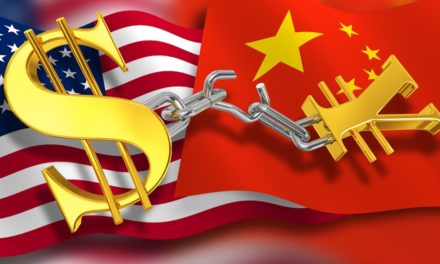Story Highlights
- China allowed the yuan to weaken in response to the escalating U.S.-China trade war.
- As a result, the U.S. Treasury gave China a label it hasn’t used since 1994.
- But China won’t devalue right now because it would hurt its economy in two ways.
- Read on for a safe, high-yield way to take advantage of the turmoil in the stock market.
Stocks that make up the S&P 500 Index lost $1.4 trillion of value in just four trading days. And Washington, D.C., capped it off by labeling China a currency manipulator.
That’s a decision the U.S. has avoided since 1994.
Sure, China allowed its yuan to weaken below a critical level of seven per dollar on Monday. We haven’t seen it that low since 2008.
But that’s not manipulation. The sudden drop in China’s yuan is a response to trade war escalation.
Smart investors will soon realize that China’s yuan manipulation is nothing to fear. Rather, it’s a buying opportunity — if you know where to look.
And I’m going to show you exactly where to find it.
2 Reasons China Will Not Devalue Right Now
Chinese officials will do whatever it takes to avoid a currency free fall. A devalued yuan will hurt more than it will help.

Conventional wisdom believes a cheaper yuan will make Chinese exports cheaper. It thinks that will attract foreign purchases and support China’s economy.
All true.
But a huge risk could more than outweigh the benefits of devaluation.
You see, the Chinese yuan is not a free-floating currency like the U.S. dollar. The dollar’s value is determined purely by supply and demand in the open market.
On the other hand, the People’s Bank of China sets the yuan’s value each day. From there, it can float within a narrow range.
China will be careful managing its currency.
A weaker currency would invite more pressure on China’s economy in two ways:
- Debt servicing costs rise. Chinese corporate defaults increased to a four-month high last month. Chinese dollar debt has doubled to $729.8 billion since the end of 2015. It’s grown at a record pace this year. That’s a double whammy! China’s economic growth is slowing. It’d be more costly for Chinese companies to service their dollar debt when their yuan aren’t worth as much.
- Capital flight undermines growth. Back in 2015 to 2016, the value of the yuan was falling. As a result, tens — if not hundreds — of billions of dollars fled from China each month. That’s a bunch of money China needed to support a slowing economy. To stop the capital flight, China spent $1 trillion of its reserves to prop up the value of the yuan. China can’t afford a repeat. If that happened, the Chinese government wouldn’t be able to backstop its financial system.
So where’s China’s yuan manipulation headed? As you see, manipulating the yuan further would be dangerous for China’s economy.
So, forget the president’s tweets.
Forget the U.S. Treasury’s verdict from Monday.
A Way to Buy Utilities and MLPs for Safe Returns
No doubt, China’s economy is in the crosshairs of the trade war and a weak yuan.
The market is volatile. But it won’t last.
For now, avoid Chinese stocks and those with a lot of international exposure.
Seek out U.S. stocks with little or no exposure to the U.S.-China trade war and the Chinese economy.
Consider the First Trust North American Energy Infrastructure Fund (NYSE: EMLP).
This exchange-traded fund tracks a group of stocks in the energy sector. They operate and serve pipelines, power transmission, petroleum and natural gas storage.
These include utilities and master limited partnerships (MLPs). An MLP is a special type of stock that offers tax benefits.
These stocks are not affected as much by the trade war’s volatility. They also pay people to own them. Those payments are called dividends.
That makes them even more attractive when interest rates are going down.
We’re keeping that in mind since the Federal Reserve cut rates last week for the first time since 2008.
EMLP is up 13% year to date. And it’s 5% cheaper than a month ago.
It pays a generous 3.79% dividend yield, and shares could jump another 13% in the coming quarters.
I’m keeping a close eye on the markets. Stay tuned to my Winning Investor Daily articles for insight into the stock market’s volatility and any news of China’s yuan manipulation.
Good investing,

John Ross, Editor, Apex Profit Alert
P.S. Join me at this year’s Total Wealth Symposium in Amelia Island, Florida. I will be discussing a strategy you can use to profit from volatile times in the stock market.










